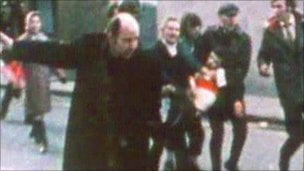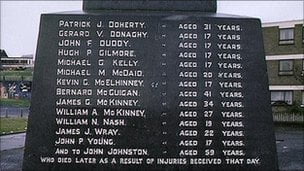The government is to pay compensation to the families of those killed and wounded on Bloody Sunday.
The Ministry of Defence (MoD) has written to legal representatives of most of the families after a request to David Cameron.
Two sisters of one victim have rejected the offer.
Fourteen people died after members of the British Army’s Parachute Regiment opened fire on civil rights marchers in Londonderry on 30 January 1972.

Fourteen people died in 1972 when British soldiers opened fire on civil rights marchers in Londonderry
The MoD has confirmed it intends to resolve the claims as quickly as possible. It is not yet known who exactly will be compensated and by how much.
The letter from the law firm Madden and Finucane, representing many of the families, asked the government what steps it was taking to “fully compensate” the families for “the loss of their loved ones, the wounding of others, and the shameful allegations which besmirched their good name for many years”.
In a statement an MoD spokesperson accepted that members of the armed forces had acted wrongly and that the government was “deeply sorry”.
The statement confirmed that compensation would be paid “where there was a legal liability to do so”.
The letter from the law firm Madden and Finucane, representing many of the families, asked the government what steps it was taking to “fully compensate” the families for “the loss of their loved ones, the wounding of others, and the shameful allegations which besmirched their good name for many years”.
Apology
In a statement an MoD spokesperson accepted that members of the armed forces had acted wrongly and that the government was “deeply sorry”.
The statement confirmed that compensation would be paid “where there was a legal liability to do so”.
When the prime minister presented the Bloody Sunday report to parliament in June last year he apologised and said the shooting by the Army was both “unjustified and unjustifiable”.
Quoting those words, Madden and Finucane solicitors wrote to Mr Cameron in January of this year asking him what the government intended to do “to fully compensate their clients for the loss of their loved ones and the wounding of others”.
Key issues around compensation
•All the parents of those killed on Bloody Sunday have died
•Many of those wounded are now dead
•Most of the dead were young, single, with no dependents
•The MoD has proposed a points system to avoid discrimination
•Some families have already been compensated
•One MoD letter states that previous compensation payments will be deducted from any new payment
The Ministry of Defence has now written to the lawyers saying that it would like to resolve the compensation claims as quickly and efficiently as possible.
In a statement to the BBC, the MoD said that it acknowledged the pain felt by the families for nearly 40 years and that members of the armed forces “acted wrongly”.
East Londonderry MP Gregory Campbell said the prime minister had opened “what may be a pandora’s box” as a result of his “desire to bring closure” through his statement last year on Bloody Sunday in the House of Commons.
He said clarity was needed with regard to the MoD’s response on the issue.
“We need to see what the extent of that commitment is in relation to other relatives of other victims who may also feel aggrieved they haven’t received adequate compensation,” he added.
The question of who will be compensated in relation to Bloody Sunday could be a complicated one.
Some families have indicated that they are not going to seek compensation until a soldier is prosecuted.
Meanwhile, Kate and Linda Nash, who are sisters of one of the victims William Nash, have described the government’s offer of compensation as “repulsive” and said they would not accept payment “under any circumstances”.
Many of those directly affected by the events of Bloody Sunday have since died and it is not known at this stage if the wider families of the dead and wounded will actually make claims.
It is likely that at least some families will be compensated for a second time.
In 1974 the Ministry of Defence made mostly small payments of a couple of hundred pounds without accepting any blame to the families of the dead.

A memorial commemorating the names of the victims
In a statement on Thursday, Madden and Finucane said the ex-gratia payments made to the victims at that time were based on the “flawed conclusions” of the Widgery Report and were “derisory and wholly inappropriate in amount”.
“The victims will not, therefore, be compensated ‘twice’ as has been claimed by some commentators,” Peter Madden said.
He said there was “nothing unusual about the payment of proper compensation in a case like this”.
Mr Madden said it would be considering the MoD correspondence with those families it represented and discussions would commence soon with the MoD “in order to resolve the issue”.
The Saville Inquiry into the events of Bloody Sunday opened in 1998 and took 12 years to complete at a cost of around £195m.
You must be logged in to post a comment.